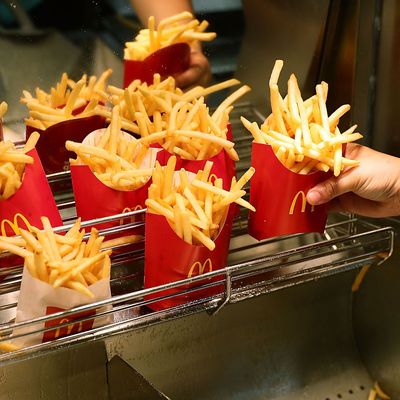
You may prefer it if the words “unexpected scientific breakthrough” aren’t associated with your food, but researchers nevertheless claim that they’ve developed a method of curing baldness in mice using a silicone polymer that Mickey D’s puts in its cooking oil. This connection — as tenuous as it may be — has nevertheless gotten people excited about the idea of follicle-stimulating French fries:
“Scientists claim chemical used in McDonald’s chips can cure BALDNESS and even regrow hair,” raves the Daily Mail.
The Post runs with, “Chemical in McDonald’s french fries could cure baldness: study.”
Syracuse.com offers a similar take, “McDonald’s fries chemical could help cure baldness, study says.”
Here’s SFGate: “Study: McDonald’s fries ingredient may cure baldness.”
Refinery29, meanwhile, goes hardest: “McDonald’s French Fries Might Cure Hair Loss, Reports Best Study Ever.”
Fries cure baldness! That is solid #content. Really, though, here’s the deal: Among the handful of artificial ingredients still used by McDonald’s is an additive called polydimethylsiloxane. It’s vinegary-smelling, and outside of food, you’ll find it in adhesives, caulks, cosmetics, and some gas-relief medicines. It’s in Silly Putty, too. McDonald’s uses the stuff as an anti-foaming agent in cooking oil, but does so as quietly as possible: Online, it lists five main ingredients in its “World Famous Fries®” (potatoes, vegetable oil, dextrose, sodium acid pyrophosphate, and salt), but if you find the very small font at bottom, that part of the page says: “Our fried menu items are cooked in a vegetable oil blend with citric acid added as a processing aid and dimethylpolysiloxane to reduce oil splatter when cooking.”
It isn’t dangerous, according to the FDA, but it also doesn’t seem like actual food. Either way, Japanese scientists have reportedly discovered yet another use for this wonder ingredient: making hair grow on mice. Writing in the journal Biomaterials, the Yokohama National University team explains that they cultured hair-follicle germs in a dish using polydimethylsiloxane, then transplanted them into rodents. They say the procedure proved “very robust and promising,” and think it could even be used to treat hair loss in humans. Balding is a condition that’s foiled scientists for years, but this group claims that their “simple” technique sprouted black hairs on mice “within days.”
We don’t want to diminish people’s enthusiasm for this development, but maybe it’s worth being a little skeptical? It’s perhaps less exciting that a chemical can grow some hair on mice, and more alarming that scientists are only now figuring out this surprise use for an ingredient that is in both French fries and Silly Putty. Yum!




